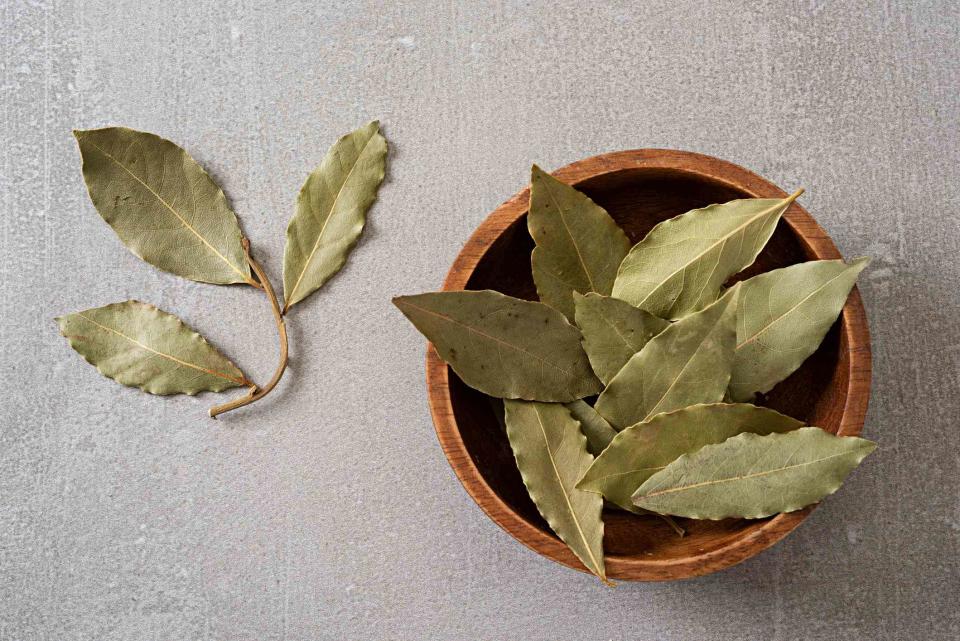Does A Bay Leaf Really Make a Difference?
Yes, more than you think.

Getty Images/BURCU ATALAY TANKUT
Fact checked by Jennifer Hawk
You don’t forget the first time you find a bay leaf in your soup. You either dredge up a big leaf, confused as to how foliage made its way into the pot, or you have the misfortune of biting into a piece of the leaf left behind, enveloping your mouth in a strong, medicinal flavor.
If this experience with bay leaves left a bad taste in your mouth, you’re not alone. Many people insist they are unnecessary, despite being called for in many soups, stocks, and sauces. Perhaps you aren’t a disbeliever, but have omitted the bay leaf from recipes when you’ve run out, and hadn’t noticed the difference. At Southern Living, we're on team bay leaf, and here's why you should be too.

Getty Images/BURCU ATALAY TANKUT
What Is A Bay Leaf?
Bay leaves are the leaves of the bay laurel tree that grows in the Mediterranean. Most bay leaves sold at grocery stores come from Turkey, although you will sometimes find California bay leaves, which come from the California laurel tree, and have a more slender shape and intense flavor. In the U.S., Bay leaves are typically sold dried in the spice aisle, but can be found fresh in the produce section at some markets.
What Is A Bay Leaf's Flavor?
In their fresh form, bay leaves tend to be more bitter and pungent, while dried they taste more herbal, with flavor notes similar to thyme or oregano. They are often described as having notes of eucalyptus, menthol, and pine.
If you're curious as to what the flavor of bay is on its own, try boiling a few leaves in water and compare the taste of that water to regular. Those subtle floral and herbal notes? That’s the bay.
As with many spices, the longer they linger in the back of your pantry the less pungent they become.
“The reason people think that bay leaves don’t add flavor is because most bay leaves are dry to the point of no flavor. Like all dry herbs, bay leaves have a short shelf life and after several months will lose a lot of their flavor. Freshly dried bay leaves, properly stored, add a distinct earthy sassafras flavor to gumbos and stews,” said chef Isaac Toups of Toups' Meatery in New Orleans.
Moral of the story: If you don’t think bay leaves have any flavor, it might be time for a new jar.
Related:How Long Do Spices Last?
What Are Bay Leaves Used In?
Bay leaves are in more than you think. They are a key flavor in pickling brines and cures, a classic seasoning in stocks, and a flavor-enhancer in hearty soups and braises. Bay leaves are classically used with fish, and many iconic dishes of the South, like Louisiana Gumbo. Their flavor really shines when allowed to cook for long periods of time, and can be bloomed in hot fat, like other whole spices. Bay leaves are most commonly added whole to a dish, simmered, and then removed before serving.
Beyond the savory, bay leaves are sometimes used in desserts, especially dairy-heavy desserts, like custards, panna cottas, and ice creams. Bay Leaves help brighten these rich desserts with fresh herbal flavor.
"I’ve also found that bay leaves can really enhance beverages, such as tea or spiced apple cider, adding fragrant herbal notes to the drink," said Executive Chef Kristin Beringson of Henley in Nashville.
If you still aren’t on board with bay leaves, just know that Old Bay wouldn’t taste like Old Bay without bay leaves.
Does Adding A Bay Leaf Actually Make A Difference?
Yes. The best proof is if you’ve ever had a dish where someone got overzealous with the bay leaves. The flavor hits you immediately, and is easily overwhelming. If dried bay leaves are relatively fresh, two or three are typically more than enough in a single recipe.
Used in surplus, dishes tend to have a medicinal and unpleasantly bitter taste. In normal amounts, especially in braises, the bay is going to have a more subtle flavor, which if left out might not be perceptible at first, but might leave you wondering, “What is this dish missing?"
As Beringson notes, "Bay leaves won’t bonk you over the head with flavor, but will add a subtle aroma to dishes. They can lighten a heavy dish, or add depth of flavor to a simple stock. There are hundreds of uses for them, and they shouldn’t be counted out as they have a lot to add!"
For more Southern Living news, make sure to sign up for our newsletter!
Read the original article on Southern Living.

